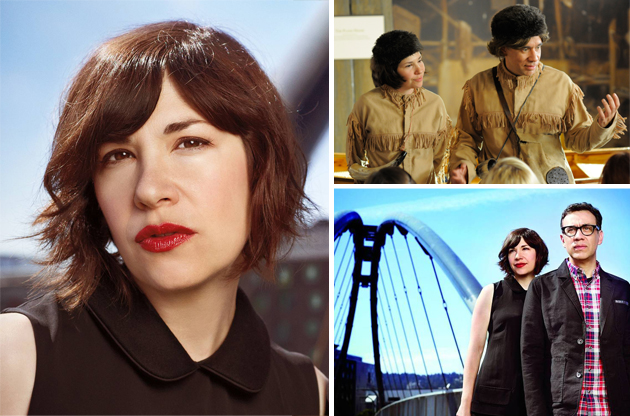
Even though it’s early January and Portland is a partly cloudy 48 degrees today, we can’t stop thinking about the place. It might have something to do with our excitement over IFC cult hit Portlandia’s season 3 premiere tonight. If you haven’t seen the show, it’s a smart, slightly irreverent sketch comedy starring Fred Armisen and Carrie Brownstein that pokes fun at recycling, pickling and just about every other aspect of life in the Pacific Northwest. We recently caught up with Brownstein, a Seattle native who moved to Portland in 2000, to see how much of the funny business is actually backed by facts.
What aspect of Portlandia’s new season are you most proud of?
When we were going into writing season 3, we were thinking about other shows that we loved and what drew people to them and what kept people coming back. We realized it was mostly characters and stories. It’s the people whom you relate to on screen, whose lives you want to follow and whose trials and tribulations you want to have a stake in. So, we really worked on character development this season. And we realized we had set up all these characters but hadn’t really explored their lives too much. We spent a lot of time figuring out how to write stories for them. So, there’s a lot of episodes with deep exploration of the characters, which I’m really proud of. The show feels mature and more fully realized.
On the show, the city is presented in a quirky, kind of hippie fashion, but it still feels warm. Is this how you would define Portland?
I think that Portland is a really well-meaning, beautiful city that tries to be inclusive and special. It’s a little bit sensitive, but it’s a very highly curated city. I kind of think of it as the city of greatest hits. The city planners kind of looked around at some of the great cities in America and Europe and thought, “Okay, what should we have? We should have good public transport. Each little neighborhood should be self-contained with restaurants and shops and grocery stores.” People actually live in the city, which is really nice. It doesn’t have a lot of suburban sprawl. It’s a very pleasant city.
Would you characterize Seattle in the same kind of vein?
Seattle feels like such a real city compared to Portland. You drive up on the I-5 freeway and you round the bend and see this beautiful skyline with skyscrapers and tall buildings. It just has a density and a grandeur that Portland doesn’t have. Portland has a quaintness to it that Seattle doesn’t have. Seattle’s a little more cosmopolitan than Portland. I think if you were to go to the two northwest cities, you would feel that Seattle has the real city vibe and Portland has a little bit of the younger sibling vibe.
What places speak to the essence of Portland?
If you have never been there, I’d say Forest Park, which is the largest city park in the U.S. It’s full of wonderful hikes and nature trails, and it really just shows off the proximity Portland has to nature. A lot of Forest Park borders the West Hills, which is a neighborhood. So, you have this really easy access to this green, dense, woodsy walk. At certain times, you get a really beautiful vantage point of the city.
That’s the nature place I’d tell you to go, but not everyone likes nature. Powell’s Books is the largest independent bookstore in the U.S., and it takes up an entire city block. That just really exemplifies Portland’s pioneering spirit of really valuing local, small businesses instead of big-box stores. I think people forget it because there’s so many new things in Portland, like there’s new restaurants to love and new little boutiques and businesses to love, but Powell’s is sort of the first. It really stands as this great symbol for the city.
What is the food scene like in Portland?
There’s so much good food in Portland right now. There’s this great new restaurant called Boke Bowl, which is this lunch spot in Industrial Southeast where you can get amazing ramen noodles and buns. It has this great Brussels sprout dish. There’s a restaurant called Ned Ludd that cooks everything over this wood-fire stove, and it’s very rustic. I could send you to 20 different restaurants and you would never be dissatisfied.
Photos Courtesy of Christopher Hornbecker, Danielle Mathias and IFC

